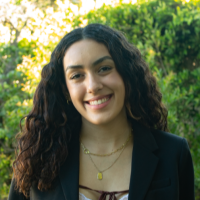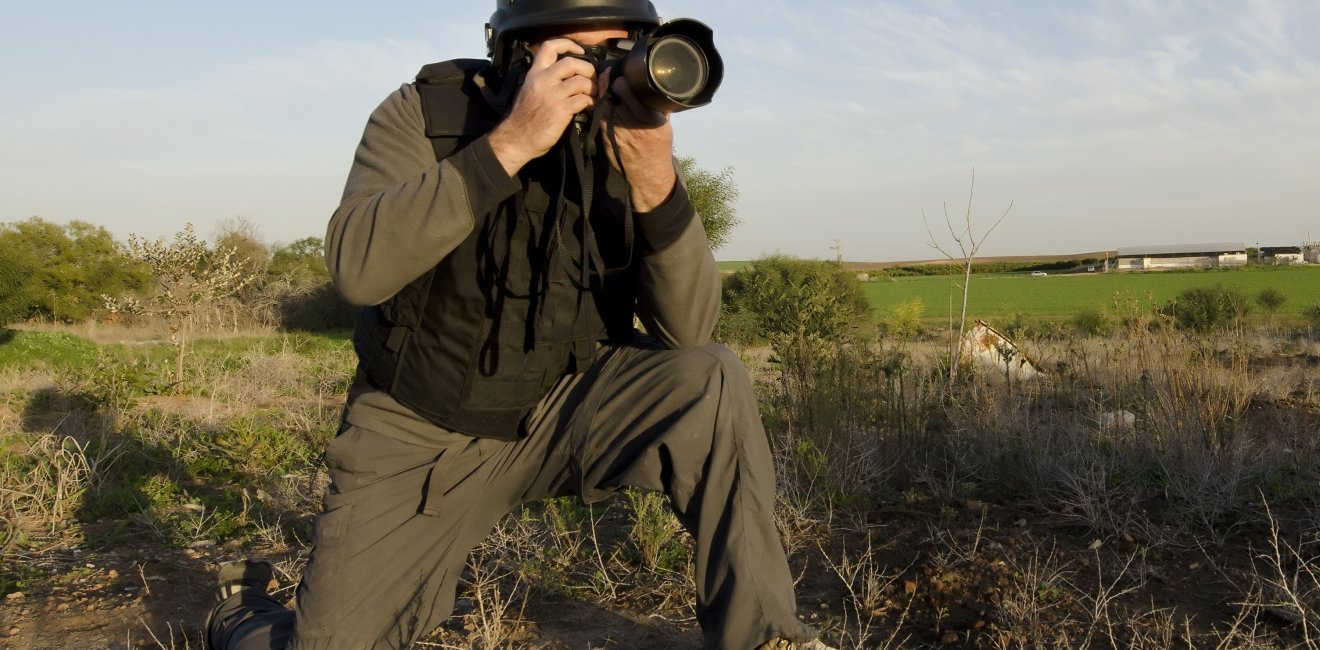
A blog of the Middle East Women's Initiative
“I want to put readers in the shoes of these people. Imagine their lives,” Elejla said. “They are people who have the same dreams as you, the same hopes."
“I did not feel like we are in a new year. Nothing has changed,” Palestinian journalist Ruwaida Amer wrote via direct Twitter message. “I would be lying if I told you that I understand what is happening around me. Everything is changing for the worse quickly, and we do not know what will happen to us the next day.”
A viral photo of Al-Jazeera Bureau Chief Wael al Dahdouh touching a press helmet placed on his son’s grave rung in the new year in the Gaza Strip. His son, Al-Jazeera cameraman Hamzah al Dahdouh, and freelance videographer Mustafa Thuraya were killed in an Israeli airstrike on January 9 while driving to an assignment close to Rafah, near the Gaza-Egypt border.
Wael al Dahdouh is representative to many not only of the tragedy faced by thousands of Gazan families but the perseverance of Palestinian journalists. Following his son’s funeral, Wael al Dahdouh told an NBC news crew in Gaza that, despite his pain, he would continue his work “as long as we are alive and breathing.”
This sentiment is echoed by other journalists in Gaza who were forced to face the question of whether to continue risking their lives by reporting.
“I feel that I will be killed at any moment. But what motivates me the most to keep working is my feeling of duty as a journalist,” journalist Aseel Mousa said. “I feel that this is my responsibility.”
Mousa is one of the many Palestinian journalists living in the Gaza Strip. The 26-year-old writes articles on Palestinian deaths and profiles of those still living in the region, despite the increasingly dire living conditions in central Gaza.
Mousa and her family were displaced from their home in the Tel al-Hawa neighborhood of Gaza on October 15, joining the over 100,000 Palestinians living in the Maghazi refugee camp. She has since lost nine of her relatives, including seven children, in an Israeli air raid on her granduncle’s home.
The deadliest conflict for journalists
The Israel-Hamas War is the deadliest conflict for journalists in modern history—with more journalists killed in the first ten weeks of the conflict, more than in any single country over an entire year, according to the Committee to Protect Journalists. Seventy-nine journalists have been killed since the onset of the Israel-Gaza War on October 7: fifty-four of which were Palestinian, four Israeli, and three Lebanese located on Lebanon’s southern border with Israel.
"Anytime you have the killing of a journalist, you're killing people whose job it is to tell what other people don't want to be told," Daniel Kubiske, co-chair of the International Community of the Society of Professional Journalists, said. “Any intimidation of a journalist is a threat to general freedom.”
After Mahmoud al-Nouq was killed by an Israeli airstrike on October 22, Mousa recognized the painful responsibility, as a journalist, that comes with surviving and feeling the need to tell the stories of those who do not. Mousa hopes that the world will not view her colleague as merely a statistic.
“I actually found it so difficult to write the story of my colleague who was killed in the Occupation in Gaza,” Mousa said. “I thought it was my duty to let the world know he was so ambitious, so hardworking, such a dreamer. I did not want the world to forget him.”
Reporting challenges in Gaza
Though the Reporters Without Borders accused Israel of targeting journalists and called on the International Criminal Court (ICC) to investigate journalist deaths, Israel’s military continues to deny the accusations. Israel also argues that the ICC does not have the jurisdiction to intervene in their state, as Israel is not one of the 122 ICC members. This leaves many Palestinian journalists out of reach of international aid.
“We face many difficulties. There is no protection for us,” Palestinian journalist and video reporter, Amer wrote. “There are many institutions that care about journalists in the world but cannot protect them.”
The tensions surrounding the international community’s claims that Israel is targeting journalists are heightened in the context of Israel limiting access of international journalists to the region. Israel’s Supreme Court upheld the ruling that international journalists could not be allowed anywhere without a military escort.
“Nobody in the military wants journalists there,” Kubiske said. “So, I’m not surprised that the IDF is trying to keep journalists out. But it’s important for journalists to be there to tell the truth, to tell what is really happening, to tell the human story of the devastation of war, and of the destruction that comes with it.”
Sherif Mansour, coordinator for the CPJ’s Middle East program, told NPR that barring foreign journalists from entering the region further enables communication blackouts in Gaza, where electricity and internet links are already down. Consequently, there is little accountability for IDF operations during these periods.
Mousa explained that writing articles without timely information from the rest of the world is extremely challenging. She has to navigate multiple barriers and resort to unconventional methods to get her stories published.
“Accurately reporting with the blackout is very dangerous and very hard,” Mousa said. “I send my phone and my laptop to someone who has a generator in their house and can charge it for me, and, sometimes, I use pen and paper to write the articles. I write, and when I have internet connection, I send it to the media outlets.”
Journalists’ resilience
Amer explains that she continues to report from Gaza despite these difficulties because she wants to highlight the importance of each victim’s life and ensure the rest of the world does not ignore the attacks on Palestinians in Gaza.
“The victims who were killed in this war all have beautiful life stories, and they are creative. In various fields, it is not just numbers mentioned on the media,” Amer wrote. “What is worse is that the Western media forced Gaza to mention the names and identity numbers of each victim in order to believe that there was a complete extermination of people in Gaza.”
Sewar Elejla, a Palestinian medical researcher, left Gaza three weeks before the October 7 attacks and now writes articles on the Israel-Gaza conflict from Canada. Reflecting on her time living in the region, she explained that many Palestinians do not have access to internet or news, so journalists are their only connection with the global community.
“Before I wasn’t exposed to news. I lived in many wars before. Sometimes there is no electricity during the whole war, no internet,” Elejla said. “But now, I feel I have a duty to them, to showcase their cause, showcase their suffering.”
Elejla said that the main goal of her writing, though from afar, is to highlight the humanity of Palestinians.
“I want to put readers in the shoes of these people. Imagine their lives,” Elejla said. “They are people who have the same dreams as you, the same hopes. So just feel them and change your mind about them.”
Though journalists continue to be killed at unprecedented rates—and for some journalists simply surviving has become all they can hope for—for many the fight to report news from Gaza continues. A group of Palestinian journalists sat gathered inside Naseer Hospital during a night of heavy air raids by Israeli forces in Southern Gaza, according to a December 4 video. Together, in an act of solidarity, they sang the Arabic song “We Will Stay Here.”
The views expressed in this article are those of the author and do not express the official position of the Wilson Center.
The original version of this post stated that the International Center for Journalists (ICFJ) accused Israel of targeting journalists and called on the ICC to investigate Israel. The ICFJ did not issue this statement. This article was revised on January 19, 2024.
Author


Middle East Program
The Wilson Center’s Middle East Program serves as a crucial resource for the policymaking community and beyond, providing analyses and research that helps inform US foreign policymaking, stimulates public debate, and expands knowledge about issues in the wider Middle East and North Africa (MENA) region. Read more


Middle East Women's Initiative
The Middle East Women's Initiative (MEWI) promotes the empowerment of women in the region through an open and inclusive dialogue with women leaders from the Middle East and continuous research. Read more

Explore More in Enheduanna
Browse Enheduanna
Women are the Catalysts for Change in Lebanon

How Education Can Empower Young Women in MENA


